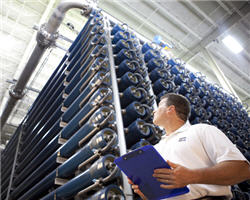Health Canada and Statistics Canada are collaborating on the study and expect to complete it in 2014. Initially they'll survey adult inhabitants in 2,000 residences near up to a dozen turbines.
A California captain is suing the Coast Guard to get his license back after causing San Francisco Bay's worst spill oil since 1988.
According to a new study in the Journal of Phycology, ocean nitrogen caused by pollution and natural sources sparks the growth of toxic phytoplankton species, which is very harmful to marine life and human health.
Seventeen states have joined the new Association of Air Pollution Control Agencies, which will create a technical forum to help states apply the Clean Air Act and associated regulations.

U.S. Energy Secretary Dr. Steven Chu cited progress on solar, wind, and EV battery initiatives in a Feb. 1 letter saying he’ll soon return to California and to academia.
NREL scientists and other researchers demonstrated a process where quantum dots can self-assemble at optimal locations in nanowires, a breakthrough that could vastly improve solar cells, lighting devices, and quantum computing.
President Obama's message was clear in his second inaugural address, and he reiterated it when Energy Secretary Dr. Steven Chu announced he will step down soon.
The USGS has announced that nonfuel mineral production values in the U.S. have increased for the third consecutive year, noting a $1.7 billion raise since 2011.
Scientists from the South Dakota University made history this year by retrieving additional ice from the main borehole as part of the West Antarctica Ice Sheet Divide Ice Core project.
EPA Administrator Lisa P. Jackson has signed amendments that strengthen existing standards for human research involving pesticides submitted by third parties for consideration in EPA decision-making. These amendments will apply to studies involving the controlled exposure of participants to pesticides.

Technicians, scientists, engineers, hydrologists, and other types of environmental jobs are increasing faster this decade than the average for all U.S. occupations, in some cases almost twice as fast.
To help minimize the amount of e-waste caused by electronics firms, TFI has developed a new training program that teaches electronics industry personnel how to reduce environmental impacts.
Following the worst oil spill in U.S. history, some question the acceleration of government contracts granted to BP prior to suspension.
The DEP has awarded $17.8 million in recycling grants to 131 municipalities and counties for developing and implementing recycling programs.
A new vice president and four new councilors have been elected to the National Academy of Science (NAS) governing Council. Their terms will officially begin on July 1, 2013.
The ARS is conducting a new study to discover how microbes in the soil that are carried off by strong winds could lead to finding ways to minimize soil damage that is caused by wind erosion.
Veolia Energy recently held a ribbon-cutting ceremony to commission the two new, natural gas-fired rapid-response boilers, which is part of the company’s multi-million dollar investment in its Philadelphia district energy network to convert it to 100 percent ‘Green Steam’.
Four communities in Tennessee have received more than $15 million in low-interest loans for water and wastewater infrastructure improvements.
Three gold mining companies in Nevada have been fined $618,000 for failing to correctly report toxic chemical releases and waste management activities.
The Asia Pulp & Paper Group (APP) has put an end to clearing natural forests in Indonesia, which applies to all suppliers.